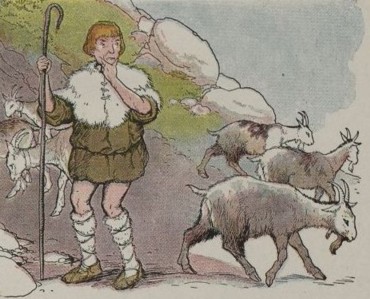PART A_1
Let’s learn vocabulary. Listen and repeat the words and the sentences with your tutor.
PART A_2
| 1. shelter | /SHEL-ter/ |
| -a place that protects you from bad weather or danger | |
| The domestic animals saved from the streets were brought to a shelter. | |
| 2. treat | /trit/ |
| -to behave toward or deal with someone in a particular way | |
| She was treated by her parents very well, so she grew up a good person. | |
| 3. unwise | /an-WAYZ/ |
| -stupid and likely to cause problems | |
| Her decision was very unwise and detrimental to the company. | |
| 4. sake | /seyk/ |
| -in order to help or bring advantage to someone or something | |
| For the sake of his younger brother, he decided to stop schooling. | |
| 5. scamper | /SKAM-per/ |
| -to run with small quick steps | |
| In order to avoid taking a bath, the toddler scampered off to his room. |
PART B_1
Let’s read the story. Please read them aloud, and I will check your pronunciation and intonation.
PART B_2
The Goatherd and the Wild Goats

One cold stormy day a Goatherd drove his Goats for shelter into a cave, where a number of Wild Goats had also found their way. The Shepherd wanted to make the Wild Goats part of his flock; so he fed them well. But to his own flock, he gave only just enough food to keep them alive. When the weather cleared, and the Shepherd led the Goats out to feed, the Wild Goats scampered off to the hills.
“Is that the thanks I get for feeding you and treating you so well?” complained the Shepherd.
“Do not expect us to join your flock,” replied one of the Wild Goats. “We know how you would treat us later on if some strangers should come as we did.”
It is unwise to treat old friends badly for the sake of new ones.
“Is that the thanks I get for feeding you and treating you so well?” complained the Shepherd.
“Do not expect us to join your flock,” replied one of the Wild Goats. “We know how you would treat us later on if some strangers should come as we did.”
It is unwise to treat old friends badly for the sake of new ones.
PART C_1
Let’s answer comprehension questions. Please answer them based on the story.
PART C_2
| 1. | Why did the Goatherd feed the wild Goats more than to his own flock? |
| 2. | What did the wild Goats do when the weather cleared? |
| 3. | Why did they refuse to be part of the Goatherd’s flock? |
PART D_1
Let’s discuss the story. Please answer the questions below and express your opinions.
PART D_2
| 1. | What do you think the original flock felt with the way they were treated? |
| 2. | Was the Goatherd right in treating them that way? Why or why not? |
| 3. | What could the original flock do to prevent the Goatherd from doing the same thing again? |
| 4. | Do you agree with the moral of the story? Why or why not? |
| 5. | Why do you think it is important for us to keep our relationships with our long-time friends? |
REVIEW AND FEEDBACK
Now, let us review the things that you learned in this lesson.
ではこのレッスンで学んだことを振り返りましょう。
(Please give a short feedback on how your student did on your class.)
| Grammar 文法 |
Pronunciation 発音 | Vocabulary 単語 |
Comprehension 理解 |
|
|---|---|---|---|---|
 GOOD GOOD |
文法の誤りはほとんどなく、完全な文章で話すことができる | ほとんどの単語をはっきりと正しく発音することができる | 習った表現を適切に使うことができる | 文章を理解し、質問に正しく答えることができる |
 FAIR |
文法の誤りはあるが、完全な文章で話すことができる | 発音の練習が必要な言葉がいくつかある | たまにミスはあるが、習った表現を適切に使うことができる | 文章を完全に理解するのは難しく、質問に正しく答えられないときもある |
 POOR |
文章で話すのは難しく、単語だけで話すことができる | 発音の練習が必要である | 習った単語と表現を少しだけ使うことができる | 文章を理解するのは難しく、質問に答えるのは難しい |
Parts of this lesson material are based on:
An eBook from The Project Gutenberg.
This eBook is for the use of anyone anywhere at no cost and with almost no restrictions whatsoever. You may copy it, give it away or re-use it under the terms of the Project Gutenberg License included with this eBook or online at www.gutenberg.org
An eBook from The Project Gutenberg.
This eBook is for the use of anyone anywhere at no cost and with almost no restrictions whatsoever. You may copy it, give it away or re-use it under the terms of the Project Gutenberg License included with this eBook or online at www.gutenberg.org